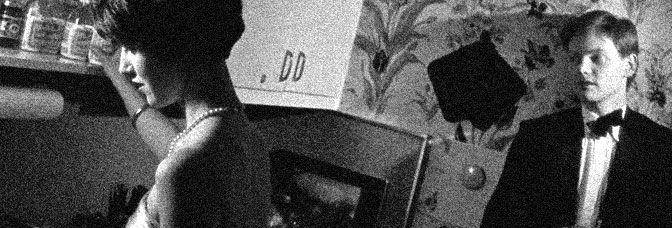Metropolitan has an incredibly traditional, incredibly cinematic conclusion, which might be why it’s so funny. But why it’s so perfectly in place is the characters–at least the more intelligent ones–impression of the conclusion. They’re aware it’s the Hollywood ending, but it’s a Hollywood ending in the context of Metropolitan, which is something altogether different.
Whit Stillman creates a playground–a living room, really–and sets eight college students on break loose in it. Stillman’s playground is idealized at the start, as (the viewer–and characters–soon discover) middle-ish class Edward Clements starts hanging out with an upper class group, quite by accident. Everyone seems great–with Chris Eigeman playing the fantastic comic relief. Stillman’s script is, for the first three-quarters, mostly conversations. The conversations pretend to be intellectual, but Stillman is actually going for a punch line. The punch lines are quiet and subtle (the equivalent, I suppose, of a “New Yorker” cartoon) and wonderful.
Cracks in the crystal appear as the narrative progresses, with Eigeman at one point being ostracized for–surprisingly–being a stand-up guy. There’s a decided equality between the men and women at the start and it slowly becomes clear they appear equal only because of Stillman’s approach to the narrative. Once the group is broken apart into factions, reality encroaches and the vacation comes to an end. The film has fast pacing, something about Stillman’s cuts between conversations and his use of transitions–it just moves.
At the end, when conflict and tension arise, Stillman can’t accelerate the pace enough. The threat of danger in the snow globe, it’s almost too much to bear. And Stillman recognizes it and has as much fun with it as possible.
Stillman’s direction is, from the first scene, when a camera scans slightly downward, exquisite. Watching the ways he gets eight people into a frame is a joy. There’s an early shot, a conversation between two people on either side of the screen. The third joins in the mirror, which is a great use of Chekhov’s shotgun. His script, both in terms of dialogue and plot, is similarly excellent. His assuredness makes Metropolitan.
The acting is incredibly important, mainly Carolyn Farina as the female lead. She does a great job (it’s her only lead performance). Clements is good as the male lead, Eigeman’s hilarious in his supporting role. Taylor Nichols is also good, as are Allison Parisi and Dylan Hundley. Bryan Leder’s character spends the majority of the film drunk or recovering from drunkenness and has some great moments.
Metropolitan, with its WASP protagonists (who sit around and argue about what kind of socialist to be), is kind of a hard sell. The film’s McGuffin is the class angst, even though the film’s opening scene is beautifully human and should give away the film’s intentions right off. But Stillman can hide it, because many of the conversations are just so disconnected (it doesn’t hurt everyone’s wearing formal attire). The shots of “regular” New York are some of the film’s larger revelations. Seeing Farina walk down a street, like anyone else, grounds the film and the viewer’s perceptions.
Stillman spends a lot of time playing with the viewer’s impressions of the characters. He simply lops off the part of the narrative where the viewer gets to finally make informed judgments. Metropolitan is about spending ten days with people you’re never going to see again–with a handful of exceptions, of course.
It’s a rewarding vacation.
 ★★★★
★★★★
CREDITS
Written, produced and directed by Whit Stillman; director of photography, John Thomas; edited by Christopher Tellefsen; music by Tom Judson and Mark Suozzo; released by New Line Cinema.
Starring Carolyn Farina (Audrey Rouget), Edward Clements (Tom Townsend), Chris Eigeman (Nick Smith), Taylor Nichols (Charlie Black), Allison Parisi (Jane Clark), Dylan Hundley (Sally Fowler), Isabel Gillies (Cynthia McLean), Bryan Leder (Fred Neff), Will Kempe (Rick Von Sloneker) and Ellia Thompson (Serena Slocum).
RELATED

Leave a Reply